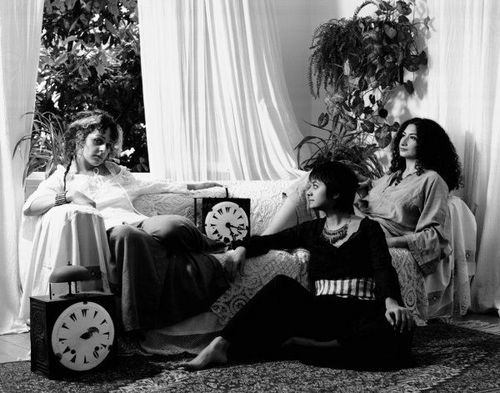Gulsun Karamustafa
dal 20/3/2006 al 20/4/2006
Segnalato da
20/3/2006
Gulsun Karamustafa
Prometeogallery, Milano
L'artista ha vissuto ed interpretato, con il suo lavoro, gli ultimi avvenimenti della Turchia contemporanea, oltre gli stereotipi della tradizione iconografica e mediale locale. Il suo lavoro non e' mai schematico poiche' vi ritorna spesso, modificandolo. La foto diventa installazione, il video fotografia, l'installazione pellicola e cosi' via. A cura di Teresa Macri'.

----english below
Black and White visions
a cura di Teresa Macri'
La Karamustafa ha vissuto ed interpretato, con il suo lavoro, gli ultimi avvenimenti della Turchia contemporanea, sfondando, con il suo lavoro, quelli che sono sempre stati gli stereotipi della tradizione iconografica e mediale turchi.
Tutto il lavoro dell’artista e' legato alla conoscenza e alla riplasmazione dell’essere contemporaneo. Al suo divenire soggetto pensante in progress.
Con straordinaria leggerezza la Karamustafa riesce a sottolinearne memorie e sorpassi mnemonici, cambiamenti e traslazioni, attraverso una effervescente ecletticita' delle forme e dei mezzi. La Karamustafa ha una freschezza intuitiva data dalla stessa intensita' con cui vive la vita e con cui la traslittera in rappresentazione visuale, attingendo al proprio vissuto sociale ed agli avvicendamenti del mondo. Tocca differenti temi, tangenti tra essi: citta', vita quotidiana, religione, immigrazione, politica, economia, gender e stereotipi. L'Io e il Noi. Il suo lavoro non e' mai schematico e cristallizzato poiche' instaura con esso un fluire indagativo. E ritualmente, ritorna spesso sullo stesso lavoro, modificandolo, riadattandolo e complessizzandolo. La foto diventa installazione, il video fotografia, l'installazione pellicola. E tutto puo' ancora modificarsi, riaprirsi e reinventarsi senza fine.
Per la personale milanese Gulsun Karamustafa presentera' i seguenti lavori:
Memory of a Square (video double screen, 2005, 16’).
Sui due schermi si incatenano due narrazioni parallele. Da una parte gli avvenimenti politici e sociali della Turchia contemporanea (dal regime di Ataturk ai nostri giorni) attraverso le manifestazioni pubbliche fatte in Piazza Taksim, simbolo politico di Istanbul. Le immagini sono tratte dagli archivi storici. Dall’altra parte si enuclea la storia di un interno familiare laico di Istanbul che, vive, di riflesso gli avvenimenti politici.
Starway (video in bianco/nero, 2001, 4')
E' una sorta di cine-verite' poiche' l'artista riprende nelle prime ore della mattina, dei bambini rumeni che si radunano per le strade del centro di Istanbul nell’atto di suonare la fisarmonica. La karamustafa li ferma in immagine davanti alla antica scala di Kamondo nel quartiere di Galata. L'artista rincorre il problema della immigrazione, fenomeno molto intenso nella citta' multietnica, attraverso uno squarcio di verita'.
The Hotel Room (Installazione fotografica, 2001)
Il fenomeno immigratorio viene rivisto in questa serie fotografica attraverso le immagini che riprendono famiglie di rumeni ospitati nelle stanze di un vecchio albergo del XX secolo di Beyoglu. La Karamustafa si concentra, in particolare, nel momento specifico in cui una mamma e il figlio entrano, per la prima volta, nella stanza. Lascia liberi i due personaggi a prendere conoscenza di quel luogo che li ospitera' cosi' come sembrano essere, carichi di aspettative e speranze per il futuro incerto che verra'.
----english
Black and White visions
curated by Teresa Macri'
Gulsun Karamustafa (born in Istanbul, where she lives and works)
Karamustafa has lived the last events of contemporary Turkey, smashing in the stereotypes of the iconographic and multimedia tradition.
The entire work of the artist is bound to the knowledge and to the reshaping of the contemporary being as becoming a thinking subject in progress.
Karamustafa succeeds in emphasizing memories and mnemonic surpasses, changes and translations in an extraordinary way, through an effervescent eclecticism of shapes and mediums.
Karamustafa has a fresh intuitiveness came from the intensity she lives her life, being also able to transliterate it in representations that reach both the social level and the world’s changes.
Her works refer to various topics, all reciprocally connected, such as: city, daily life, religion, immigration, politics, economy, gender and stereotypes. The Individual Self and the Collective One. Her works are never schematic or crystallized since they are driven by an investigative flow. Ritually, Karamustafa returns on the same work over and over, modifying it, rearrange it in a more complex way.
The photo becomes installation, the video photography, and the installation film. And everything can be still changed, reopened or reinvented continuously.
On her solo’s exhibition in Milan Gulsun Karamustafa will present the following artworks:
Memory of a Square (video double screen, 2005, 16 ').
Showing on two screens two different narrations which are linked in parallel. On one side, the political and social events of contemporary Turkey (from the regime of Ataturk to our days) represented through the public protests organized in the squares of Taksim, a political symbol of Istanbul. These images are taken from an historical archive. On the other side, the history of a lay family in their home interiors in Istanbul who lives a reflection of the same political events.
Stairway (black\white video, 2001, 4 ')
It is a sort of “real-life cinema" where the artist captured on film, at first hour in the morning, some Romanian children gathered on the central streets of Istanbul to play the accordion.
Karamustafa fixed them on image in the front of the ancient stair of Kamondo in the quarter of Galata. Using a slice of reality, the artist puts the stress upon the problem of immigration, a very intense phenomenon in a multiethnic city.
The Hotel Room (photographic installation, 2001)
The immigration phenomenon is reviewed again through the images of the Romanian families hosted in the rooms of an old hotel from the 20th century situated in Beyoglu.
Karamustafa focuses in particular, onto the specific moment in which a mother and her son entered the room, for the first time,. The artist gives the characters total freedom to get acquainted to the new place that will host them, together with their load of expectation and hope for the uncertainty of the future that has to come.
Inaugurazione: martedi' 21 Marzo ore 19
Prometeo Gallery
Via Ventura 3 - Milano
Orari: da martedi' a venerdi' 11.30 - 19.30 , sabato e lunedi' su appuntamento.



